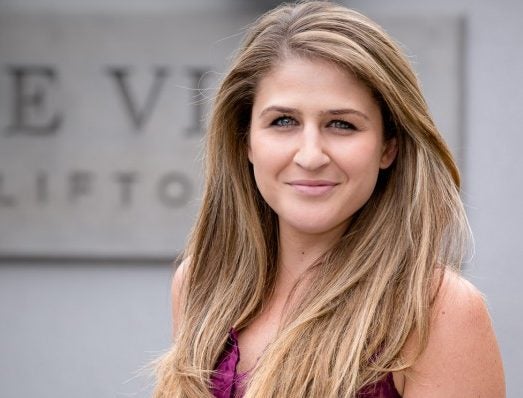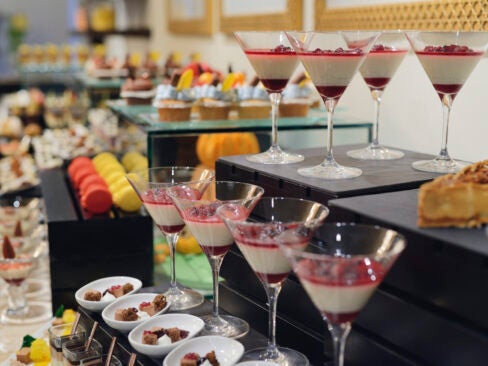Cape View Clifton is widely regarded as one of the most beautiful and idyllic places to stay in all of South Africa. Overlooking the Cape Town cliff side, the hotel focuses on offering guests a place to stay where home comforts are key. Owned and run by Jess Latimer, a born and bred South African now living in London, the property is one of the most popular honeymoon locations in the country and its easy to see why.
On top of owning Cape View, Latimer has also just launched her own online interiors shop and décor services – Latimer Living – a curated African inspired decor shop influenced by her upbringing in Durban.

When did you decide you wanted to be an interior designer?
Following work experience, I studied interiors when I left school as it was always a passion. I had done some time with different interior designers and I knew I always wanted to do it, but through that I learnt my passion lay in styling. I therefore went on to study Fashion Styling and Photography at the London College of Fashion, where I merged interior design with the styling and photography elements. Throughout my studies I ran a small business where I sourced and project managed residential property in Chelsea and Knightsbridge. Financially backed by my father, I was able to snowball this business and I ran the entire project management side while he was out in South Africa. At the same time I was fashion trend forecasting for high-street wear in South Africa, so I always sitting between the fashion and interiors world, but I never really stayed in the fashion world – I was always pulled back into interiors.

Then the opportunity to open the guest house came about as it was already an existing property, owned by my family for a number of years. Next door, there was a collection of other properties my father was interested in developing, and – rather than sell the guest house – he asked if I would be interested in getting involved. We had reduced our property portfolio in London due to the financial crash and we thought it would be a good time to make an investment in South Africa. This was around the time of the World Cup in South Africa so there was a lot of growth happening in Cape Town and was a great time for me to get back into interiors and combine it with hospitality, which I’d never worked in before.
What was the inspiration behind Cape View Clifton?
I was always surprised by how much wasted space there was in South African property, especially in older buildings like mansion blocks – there was always a lot of passageways that weren’t being used, and to me it was very important to sort out the space and make sure the kitchens and bathrooms were well thought out, and that the practicality of the property worked. It’s been the case for me over the last 12 years that I’ve been living between London and South Africa, and I’ve always enjoyed mixing the styles. For instance colonial living has always worked really well in English properties as it helped break down the more traditional interiors.
The main influence for Cape View was to ensure there was comfort and luxury in your ability to enjoy the view, and to never let the location and the backdrop of the 12 Apostles be forgotten. For me it was for neutral colour palettes, and also for creating a space that was gender neutral and enjoyable for all age ranges, specifically those who could enjoy the attention to detail and the functionality of the space, all without it being too ultra-modern and slick. The building itself is more of an old lady, a very traditional French Riviera type building and I added some modern touches to bring it into its current state.

Why did you choose Cape Town?
I am South African and my family always had an interest in Cape Town. Therefore, it was a natural progression. I absolutely love the city, food and culture and wanted an opportunity to offer something different. I also went to university here and, if I was ever going to leave the UK, I knew I wanted to be based in Cape Town.
You’ve talked before about wanting to use African designs in your properties without it becoming too cliche, how did you go about this?
I think it’s important to understand how you can do things in a subtle manner so it doesn’t lose the message. There are things we use in our South African homes that I feel magazines and the media don’t really tap into. As South Africans we don’t live with big wooden animals on our mantelpiece, but we do live a colonial lifestyle. A lot of the gardens in Durban, where I grew up, were quite English but then the art inside would be African, and the wallpaper would be Ikat, and they were always mixed in there in a sedate manner alongside these beautiful old antiques. There was always an eclectic juxtaposition of the decor for me.

You’ve just launched your own homeware range, where do you see this sitting in the market?
When I was working in hospitality, I did all my own interiors and, after some praise from guests and the media, I found myself being offered a lot of interiors job. Some of the jobs I have taken, for example include the redeveloped of a seven-bedroom house whose owners wanted to channel the feeling of Cape View Clifton. I would also have a lot of guests who had stayed at Cape View Clifton asking me for the products that I put into the house, they’d ask me where the art came from and where I got the beautiful little bone bowls that are next to the bed. I would have a lot of people coming up to me saying they already had a lot of antiques in the house and they wanted to make it feel more colonial and contemporary without it becoming ultra-modern. My thing is about adapting a space to make it comfortable and suitable for living in it.
So I kept having these requests and for a while I considered setting up an online shop, and rather than having me send the products from South Africa I thought it would be easier for me to set up a shop in England and dispatch everything to Europe and further afield.

Are you planning on rolling it out to other stockists or keeping it exclusive to your site?
At the moment I plan to keep it exclusively online as we only launched it in July. At the moment everything has been curated and all the elements have been sourced alongside the suppliers. Next year my plan is to start doing more product design myself and perhaps start having more involvement in concept concession spaces while remaining true to our brand. From a position perspective, I do see the UK as quite an interesting market as you have a lot of ultra-high-end interiors and a lot of high-street interiors. What it doesn’t have is much good quality furniture at an affordable price point, which I think often comes down to how people live in the UK – people tend to rent their house for two years, specific furniture for that place and if it doesn’t fit into the new property, leave it behind. I don’t think anybody needs to spend $10,000 on a sofa, and it would be better if people who are renting are able to afford furniture that they can leave behind if they want to or take it with them. That is the gap I’m trying to bridge specifically with my African and South African inspired products.
What defines a luxury hotel to you?
For me a luxury hotel is always a smaller property. I always feel more comfortable in a smaller property and have never liked staying in a hotel, as I prefer the intimate and homely feel of smaller properties. I like luxury hotels to have high-end products that I would almost seek to have in my own home, but often I can’t have because I can’t afford them. It needs to be better than where I live.
What separates Cape View Clifton from other hotels?
We entered the market just as AirBnB was starting to take off and when boutique hotels were a little bit more stiff. What we offered customers was their own little beach house, which allows our guests to feel like they were buying into the property for the period of time they stayed with us. It feels like it belongs to them. People really do feel completely at home and our staff are very discrete.
For more information please visit the Cape View Clifton site or the Latimer Living site









